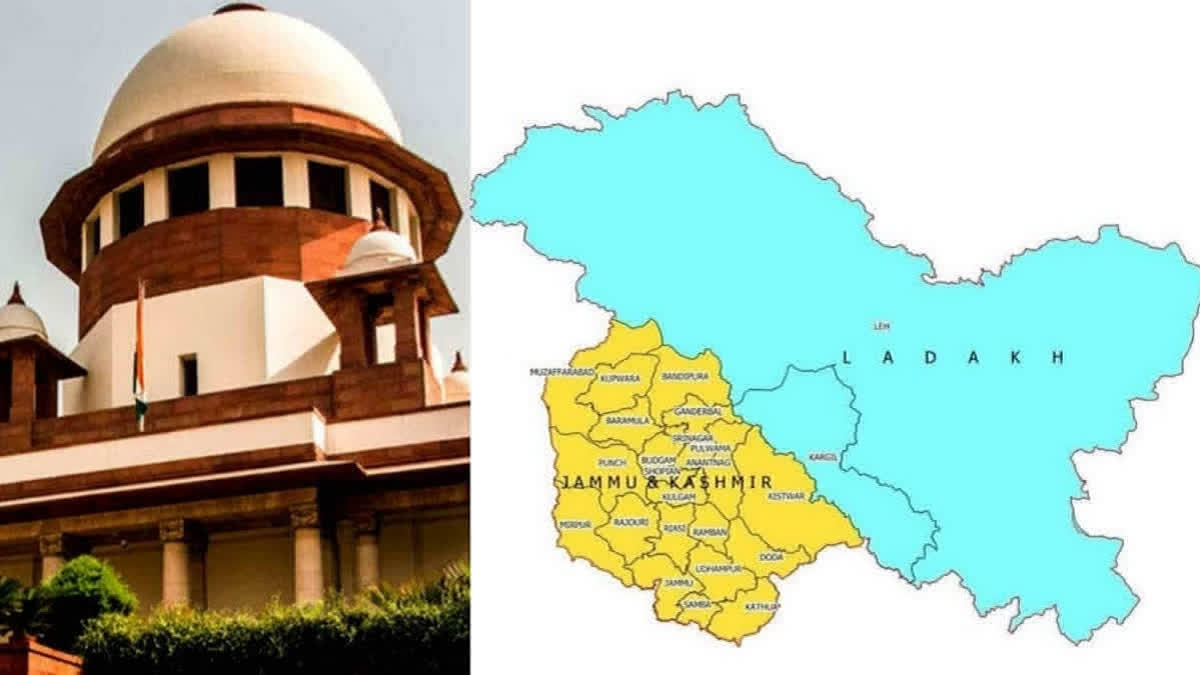New Delhi: The Supreme Court Tuesday asked the Attorney General of India R Venkataramani and Solicitor General Tushar Mehta to seek instruction from the highest level regarding a time frame to restore the statehood for Jammu & Kashmir, and also a roadmap of this progression.
A five-judge constitution bench headed by Chief Justice of India D Y Chandrachud and comprising Justices S K Kaul, Sanjiv Khanna, B R Gavai, and Surya Kant, is hearing a batch of pleas challenging the abrogation of Article 370, which bestowed special status on the erstwhile state of Jammu and Kashmir.
The Chief Justice told Mehta, representing the Centre, that the government has to also make a statement before the court that the progression of J&K back to a state has to take place and that it cannot be a Union Territory (UT) permanently.
Also read:SC refuses to interfere with Punjab, Haryana HC order staying Wrestling Federation of India polls
Mehta said it was exactly the statement made on the floor of the House and he will read that statement and that J&K converted into a UT is not a permanent feature. Mehta said after the situation returned to normalcy, “We want it to become a state again”.
The Chief Justice said, “We don’t want to bind you down because we are conscious of the fact that these are matters of national security. We understand that the preservation of the nation is the overriding concern. But without putting you in a sense of bind both you and the Attorney General may seek instruction at the highest level, is there some time frame in view?”
Tushar Mehta said the government had said once the efforts are fruitful and “everything is normal…”. The Chief Justice said, “Restoration of democracy is a very important, a vital component for our nation, we cannot have a situation where…..”. Mehta said in 2020, local government elections took place and several thousand people were elected and there are no strikes now, no stone pelting, and no curfew in J&K.
The Chief Justice said, “Therefore the progression, we take your point that progression has already begun….is their a roadmap, tell us about (what) the roadmap is?”
During the hearing, the top court noted that “As we see a creation of Union Territory post-independence you have one example like Chandigarh which was carved out of Punjab Reorganisation Act, and it was part of a state and became UT, to be common capital for two sister states”.
The Chief Justice said then you have a progression where certain areas of existing states became UTs in the progression of making them states, the northeast. “You have Mizoram, Manipur, Tripura, they were part of states they became UTs but that in the process of making them a stable administration to become states, you cannot immediately make them states”, observed the Chief Justice.
The Chief Justice said, “You can certainly say that today is not the situation to make them full-fledged states, today we will carve them out and give them a status of UT and at a future point of time when Parliament feels they are sufficiently stable institutions, we will make them states…which we did in the northeast”.
The Chief Justice orally remarked, “Why is the not possible for the Union to right now say in the case of a particular state we have such an extreme situation in terms of national security….we want for a certain stipulated period that a UT should be created but this creation of UT is not a feature of permanence but it shall again progress back to its position of a state”.
The Chief Justice observed that can the Union not have control for a certain stipulated time for stability. “Ultimately let us face it whether it is a state or UT, all of us survive if the nation survives…..should we not give that allowance to Parliament to postulate that for a certain period in the interest of the preservation of nation…we want certain stipulated period this particular state go into the fold of UT on a clear understanding it shall revert to state over a period of time”.
UT status of J&K not permanent thing: Centre tells SC
After the lunch break, the Solicitor General informed the apex court that the UT status of J&K isn't permanent and added that he would be able to make a positive statement on the timeframe on August 31 after a meeting at the highest level. Mehta said that Ladakh would remain a UT.
"The union territory status of Jammu and Kashmir is not a permanent thing. So far as Ladakh is concerned, its UT status is going to remain for some time," Mehta said.
On August 5, 2019, the Centre abrogated the special status of Jammu and Kashmir, enabled by Articles 370 and 35A of the Constitution. By abrogating these provisions, the erstwhile Jammu and Kashmir was bifurcated it into two Union Territories (UTs) of J&K and Ladakh. Soon after the move, several parties challenged it in the Supreme Court.
Also read:'Isn’t it downgrading converting J&K into UT, President rule can only be for 3 yrs’: SC questions Centre during Article 370 hearing
